Table of Contents
The number of people who have completely excluded meat, fish, eggs, milk and all other food of animal origin from their diet is steadily increasing. In the United States of America, for example, the number of vegans grew by a whopping 400% (from 4 to 20 million) between 2014 and 2018. And we can see a similar trend worldwide.
A purely plant-based diet has benefits, but also challenges to look out for. It lacks foods that are among the primary sources of vitamin B12, iron, protein, and other valuable nutrients. In foods of plant origin, these substances are often in smaller quantities or less digestible forms. For this reason, it is important to know how to develop a vegan diet properly to contain all the necessary nutrients.
A vegan diet and its benefits
A proper vegan diet can have a number of benefits. When based on staple foods such as cereals, legumes, fruits and vegetables, it typically contains large amounts of fibre, antioxidants, some vitamins, and minerals. In addition, vegan diet does not contain much of unhealthy saturated fats or cholesterol. Therefore, such a diet can have a beneficial effect on the human body and thus protect it from developing certain diseases. [1]
We can see one interesting fact from the results of various research. Vegans are more likely to adopt healthier daily habits compared to other people. They smoke and watch TV less, sleep more, play more sport and pay more attention to their health. All this in turn contributes to the fact that plant-based food lovers are often slimmer and healthier than the rest of the population. [2]
A vegan diet can also help with weight loss. Thanks to regular consumption of legumes, wholegrain cereals, vegetables and other whole foods, it also contains more fibre. Such meals then become more satiating, which can also translate into a slightly smaller energy intake. It is also naturally lower in fat and energy (energy density) compared to other nutritional guidelines. For these reasons, when switching to a 100% plant-based diet, many people slowly lose weight without counting calories. [3–4]
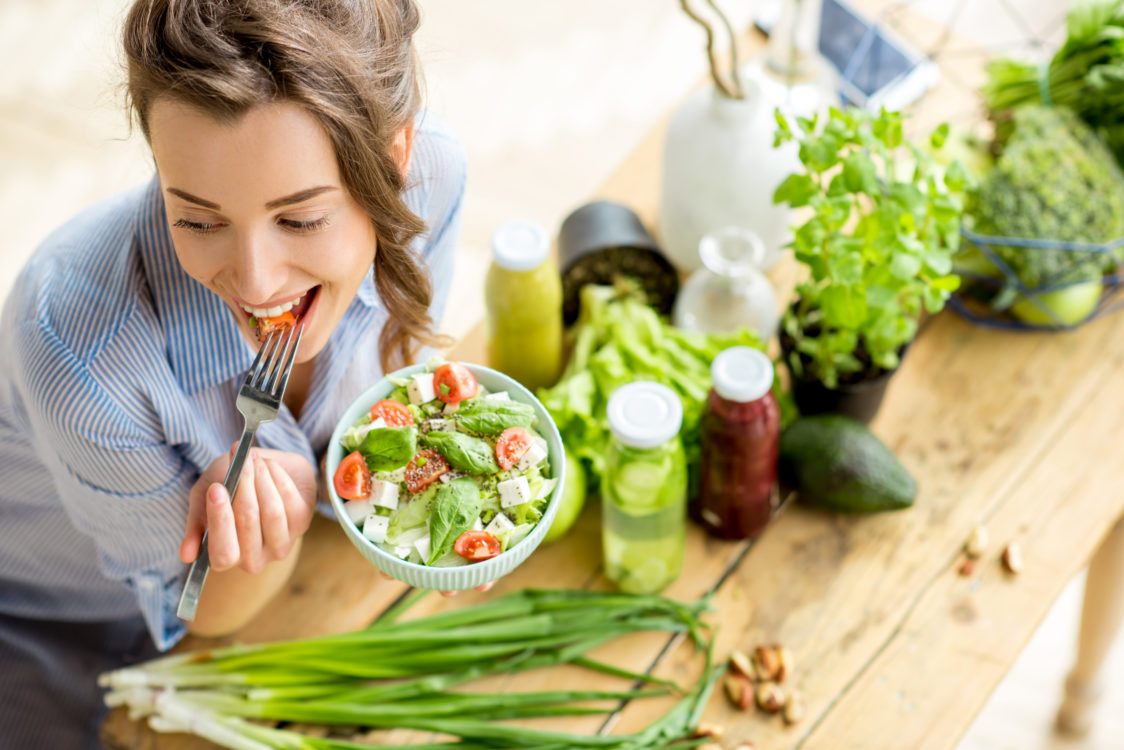
A vegan diet and its risks
On the other hand, a purely plant-based diet also has its risks, which must be considered when planning a diet. It may lack important nutrients that are mainly found in animal foods. However, some of them can also naturally be found in plant foods, but in a less usable form. Moreover, some vegan foods are often fortified with these nutrients. For this reason, it is essential for lovers of plant-based diets to know what foods to include in their diet and which substances to supplement to cover all the needs of the body. [1–2]
A purely plant-based diet can take many forms. If you plan it carefully and have a varied selection of staple foods and a minimum of highly processed foods in your diet, you can most likely meet all nutritional needs. But if you don’t think about it, and eat fries and a veggie burger because it’s vegan, then you definitely can’t call your diet healthy or balanced.
When switching to a 100% plant-based diet, it is also important to make sure you get enough energy. A vegan diet has on average a lower energy density than a mixed diet. This means that, for example, 100g of cooked lentils or tofu has fewer calories than 100g of beef. This change can quite easily lead to a decrease in energy intake, which can be dangerous, especially for athletes. The portions that vegans eat are thus often larger than those who consume a mixed diet. [5]

10 nutrient deficiencies on a plant-based diet
A diet based on cereals, legumes, fruits, vegetables, and nuts is a perfect representation of all vitamins and minerals. But the reality may not always be so rosy, as some research shows. According to one study, for example, 28% of the vegans surveyed had some sort of nutritional deficiency based on a blood test. It included low levels of vitamin B12, vitamin D, iron, calcium, or zinc. Other nutrients that a plant-based diet may be lacking include omega-3 fatty acids and iodine. However, insufficient protein intake is no exception, especially for athletes who have an increased need for this macronutrient. In their case, they might have lower levels of creatine and carnosine. [1,6]
We will describe the daily recommended intake of required nutrients according to the methodologies of the European Food Safety Authority (EFSA) and compare these values with the latest reference values of the German-speaking countries (DACH).
1. Vitamin B12
Vitamin B12 or cobalamin has a number of important roles in the body. For example, it is involved in the proper functioning of the psyche, nervous system and the production of red blood cells. Its deficiency is often manifested by a change in mood, poor concentration or anaemia (lack of red blood cells), which causes weakness, a decrease in physical performance and pallor. [7–8]
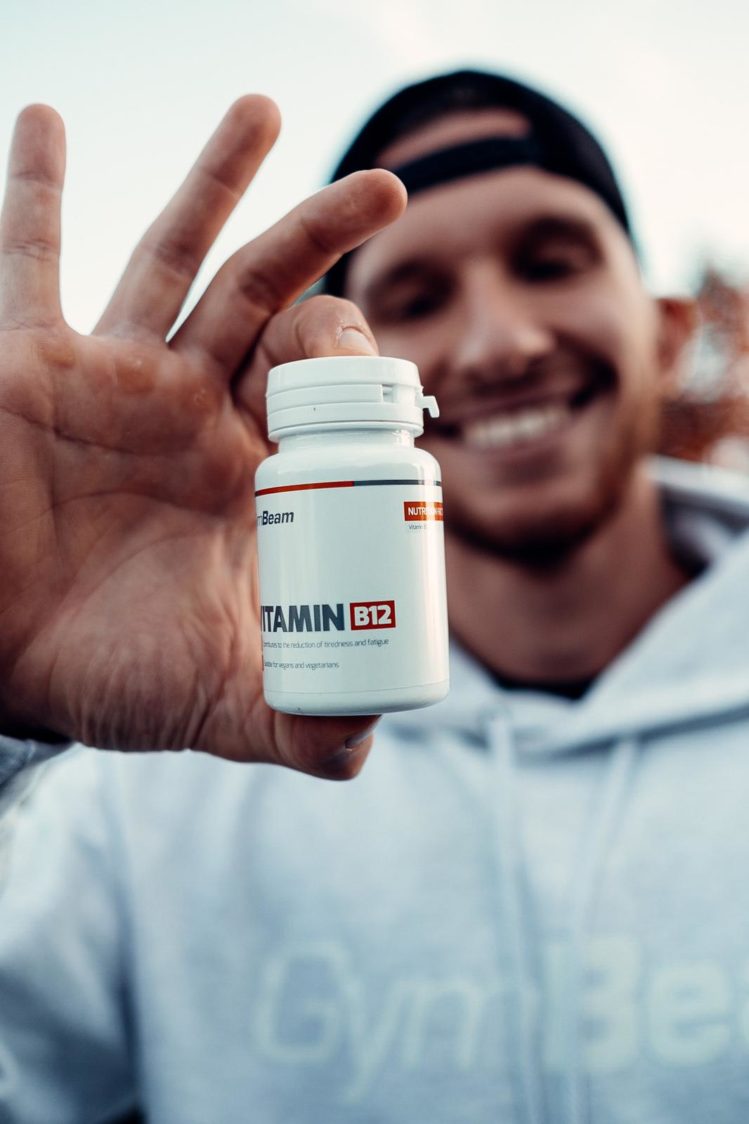
Low levels of vitamin B12 in the body are not always caused by inadequate intake from the diet. In fact, an intrinsic factor is crucial for its proper absorption. It is formed in the stomach, from which it travels to the intestine. Vitamin B12 then binds to it in the small intestine and together they form a complex (vitamin B12 and intrinsic factor) that is resistant to digestive enzymes.
Hand in hand, they then move through the intestinal wall into the blood and vitamin B12 can then travel through the bloodstream to all target tissues, thus fulfilling its function. This would not be possible without the intrinsic factor, because otherwise the vitamin B12 would get stuck in the digestive tract and be excreted out of the body unused. Therefore, when there is a deficiency of vitamin B12 in the body, it is also important to check for proper production of intrinsic factor. [7]
The main sources of vitamin B12 are foods of animal origin, and are thus logically absent from vegan diets. The natural presence of this vitamin in plant sources is rather exceptional. One such example is Nori seaweed, which is popular for making sushi. Other foods suitable for vegans have only trace amounts of vitamin B12 in their composition or their composition is not stable (brewer’s yeast, chlorella).
For this reason, plant-based dieters cannot rely 100% on these sources and often have to include fortified foods and supplements. [7, 9]
What are natural plant sources of vitamin B12 and what foods is it added to?
- Nori seaweed
- soy, oat, rice, coconut and other plant-based drinks
- plant-based protein powder
- vegetable yoghurt, cheese or cream
- delicate yeast
- plant-based alternatives to meat, ham or sausages
- tofu, tempeh, seitan
- breakfast cereals
What is the recommended daily dose of vitamin B12?
- The EFSA recommends a daily intake of 4µg for adults, but women should increase this to 4.5µg during pregnancy and 5.0µg daily during breastfeeding. [10]
- The DACH agrees with the recommended dose of 4μg daily for adults. [11]
What does The Vegan Society recommend in terms of vitamin B12 intake?
- Eat at least 2-3 servings of foods fortified with vitamin B12 daily to ensure a total intake of 3µg.
- Or take dietary supplement containing 10µg of this substance every day.
- The last option is then taking a supplement on a weekly basis which contains 2000μg. Such high doses are necessary primarily because of the limited capacity of the intrinsic factor. At this point, we have to rely partly on the passive absorption of vitamin B12, by which only 1% is absorbed into the body. Thus, in this case, up to 20μg to help meet the recommended dose. [12]
You might be interested in these products:
2. Vitamin D
Vitamin D is crucial for healthy bones and proper immune function. Insufficient amounts of vitamin D can lead to thinning bones and increased brittleness. We get it mainly from the sunlight that hits our skin. In summer or spring, when we typically spend more time outdoors, we don’t have to worry as much about vitamin D. However, this is not the case for individuals who don’t spend much time outdoors. The situation can also be problematic from autumn to spring, when there is less light and we don’t get outdoors as much. In these cases, the main sources of this substance are foods that are mostly of animal origin (fish, egg yolks, liver). This puts those who follow a purely plant-based diet at a higher risk of vitamin D deficiency. [8, 13]
The solution may be foods that are fortified with vitamin D or supplements. However, take into account that in vegan products, vitamin D is most often found in its less absorbable form – ergocalciferol (D2 ). The exception is vitamin D obtained from lichen. This is in the form of the more absorbable cholecalciferol (vitamin D3), which is otherwise found only in animal products. [8, 13]
What foods is vitamin D most commonly added to?
- soy, oat, coconut or rice milk alternatives
- vegetable yoghurt, cheese or cream
- breakfast cereals
- fruit juice
What is the recommended daily dose of vitamin D?
- The EFSA recommends that adults should take 15µg of vitamin D per day when sun exposure is insufficient. [14]
- According to DACH, we should take 20μg of vitamin D daily. [11]

3. Zinc
Zinc is a mineral that is involved in more than 300 reactions in the human body and thus plays an important role in many activities. It is essential for immune function, protein synthesis or maintaining testosterone levels in the blood. Zinc helps testosterone to form and even prevents its conversion (breakdown) into oestrogens – female sex hormones. Ladies in particular appreciate its positive effects on hair, skin, and nails. Our body cannot build up zinc stores, so regular intake is crucial. [15]
This substance is also found in pure plant foods such as whole grain cereals, oats, legumes, and nuts. Although the problem arises with the utilization of zinc from these sources as they contain phytates that impair absorption in the body. Soaking or sprouting legumes and nuts, which typically reduces the amount of phytate, could help. Dietary supplements are another option to help meet daily zinc intake. [2, 15]
What are plant sources of zinc?
- oats, quinoa, rice, wheat
- pumpkin, sesame and hemp seeds
- cashews, almonds, peanuts, and nut butters
- mushrooms
- beans, peas, lentils
- cocoa and dark chocolate
What is the recommended daily dose of zinc?
- The EFSA recommends a daily amount of 9.4 – 16.3 mg for adult men and 7.5 – 12.7 mg for women, with the higher dose being appropriate for those with higher phytate intake. During pregnancy and lactation, women should further increase this amount by 1.6 – 2.9 mg per day. [16]
- DACH recommends a dose of 11-16 mg daily for men and 7-10 mg daily for women. The daily amount also takes into account phytate intake. Pregnant and lactating women should raise their daily zinc intake to 14 mg per day. [11]
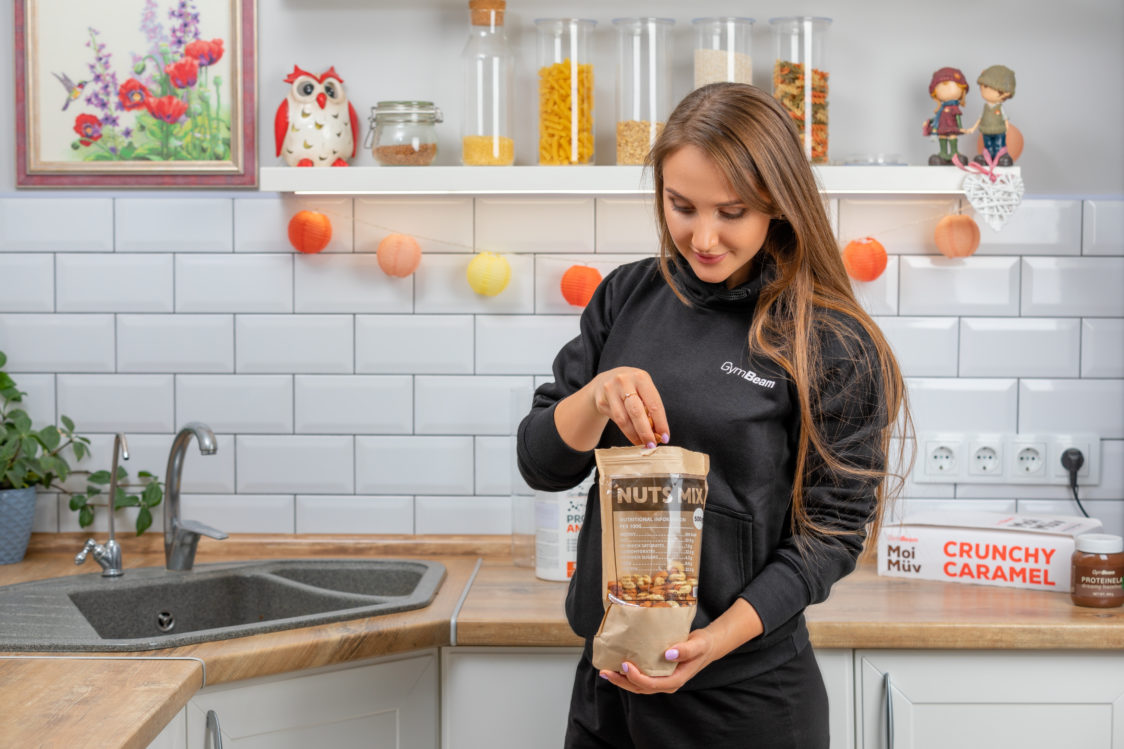
4. Iron
Iron is an essential mineral in the body, which primarily provides oxygen transport from the lungs to all body organs. It also contributes to the proper formation of red blood cells. It is an essential component of the blood pigment haemoglobin, which is crucial for their function. Low iron levels can lead to anaemia, which is most often manifested by increased fatigue, poor breathing or pale skin. [17]
In terms of sources, it is slightly similar to zinc. There are many plant sources of this mineral. But the problem arises with the usability. The iron is in a non-heme form, which is harder for the body to use than the heme form from animal foods. [2]
For this reason, vegans have a higher risk of deficiency of this substance. Therefore, they are typically advised to increase their daily iron intake by 1.8 times the standard recommendation. Soaking, sprouting, or fermenting foods can also help with iron availability. Getting some vitamin C in the form of fruit, vegetables, or supplements can also be effective. Dietary supplements can also help increase daily intake of this mineral. If you choose to take them, make sure they ideally contain a combination of iron and vitamin C. [2, 17]
What are plant sources of iron?
- lentils, chickpeas, beans and other legumes
- tofu, quinoa
- cashews, chia, pumpkin, hemp seeds
- leafy vegetables
- fortified foods (breakfast cereals)
What is the recommended daily dose of iron?
- According to the EFSA, 16 mg of iron per day will cover the needs of most individuals. [18]
- The DACH recommends a daily intake of 10 mg of iron for adult men and 10 – 15 mg for women. For women, the dose is increased due to losses during menstruation. Pregnant women should then raise the daily intake to 30 mg per day and when breastfeeding up to 20 mg per day. [11]

5. Omega 3 fatty acids
Omega-3 fatty acids are extremely important fats that are particularly important for the proper functioning of the heart, brain and eyes. They have also been found to have anti-inflammatory effects that are appreciated by people suffering from joint pain, for example. Among the best known are the well-known trio of eicosapentaenoic acid (EPA), docosahexaenoic acid (DHA) and alpha-linolenic acid (ALA). [19]
DHA and EPA are mainly found in fish and seafood. They are also found in smaller amounts in eggs and meat. Their only plant source is seaweed, otherwise animal sources predominate. For this reason, ALA, which is found in nuts, seeds, and oils from these foods, are more common in vegan diet. [19]
However, EPA and DHA are more important to our bodies than ALA. They are also more often associated with the proper function of the most important organs. Although our bodies can convert ALA into EPA and DHA, this happens at most 10% of the time. The efficiency of this conversion is also influenced by age and lifestyle. In practice, it may happen that only 1 – 5% of the ALA taken in is converted into DHA. [20-21]
This transformation can be easily stimulated by a more optimal intake of omega 6 fatty acids, which are found, for example, in margarines, sunflower oil and processed foods. Most people have an excess of omega 6 fatty acids in their diet and often need to reduce their intake to achieve a better ratio. The most ideal option is commonly considered to be a 1:1 ratio of omega 6 : omega 3 fatty acids. Unfortunately, this is typically not achievable for most people. It is then advisable to get as close to these values as possible. [2, 22]

For these reasons, vegans are advised to eat more foods with a higher ALA content and to keep their intake to 2g per day. However, they can also boost their intake of EPA and DHA by taking seaweed supplements. This is also sometimes recommended for pregnant and breastfeeding mothers who eat a vegan diet, as EPA and DHA play a vital role in the development of the baby. [2,19]
What are plant sources of omega 3 fatty acids?
- flax seeds and flaxseed oil
- pumpkin and hemp seeds and oil made from them
- walnuts and walnut oil
- rapeseed oil
- chia seeds
What is the recommended daily intake of omega 3 fatty acids?
- According to the EFSA, we should take 250 mg of EPA and DHA daily. The upper safe limit is considered to be 5g of these fats per day. For ALA, the recommendation is that its intake should be 0.5% of your total energy intake. [23]
- The DACH also agrees on the recommendation of 0.5% of total daily intake for ALA. It adds to this the recommendation for omega 6 fatty acids, which should be at 2.5% of daily energy intake. [11]
6. Calcium
Calcium is another mineral that research shows is often missing from vegan diets. It is part of the building blocks of teeth and bones and is therefore important for their proper function. It also contributes to proper muscle function. Together with magnesium, it is significant for muscle contraction, and its deficiency might result in the development of muscle cramps. Thus, fans of plant-based diets may also be more susceptible to bone thinning and fractures compared to omnivores. [2, 24]
Calcium metabolism in the body is not so simple. In fact, its absorption and utilisation is influenced by a number of factors such as the levels of certain hormones, vitamin D and K, magnesium and potassium. These substances are also involved in bone formation and function and can partially compensate for calcium deficiency. It also appears that a diet rich in fruit and vegetables with a low meat content changes the pH of the urine, which is then more alkaline (but still within physiological limits). This can lead to lower excretion of calcium from the body, which is then typically reflected in higher levels. However, this does not mean that calcium intake can be omitted completely. It is also important for proper vitamin D metabolism, muscle contraction and nerve transmission.[8, 24]
The richest sources of calcium include milk, yogurt, cheese, poppy seeds, some nuts, and vegetables. Thus, it would seem that there are plenty of plant sources containing this substance. But the problem is with the usability of some of them. The oxalates, phytates or fibre in these sources significantly reduce it. Thus, low-oxalate vegetables, fortified foods and dietary supplements are a better choice. [1, 24]
What are plant sources of calcium?
- Vegetables with low oxalate content: broccoli, kohlrabi, Chinese cabbage, turnip or bok choy, tahini.
- Fortified foods: breakfast cereals, milk alternatives, tofu, juice.
What is the recommended daily dose of calcium?
- The EFSA recommends a daily calcium intake of 1000 mg for adults up to 24 years of age. Over 25 years, 904 – 950 mg should be sufficient. [26]
- DACH has a unified recommendation for those over 19 years of age of 1000 mg daily. [11]

7. Iodine
Iodine is a mineral that is especially important for proper thyroid function. It produces hormones involved in the metabolism of nutrients (proteins, carbohydrates, and fats). It thus controls the rate of basal metabolism, which significantly influences energy expenditure. In addition, iodine supports brain activity (thinking, memory) and the nervous system. Thus, its deficiency can manifest itself in thyroid dysfunction (hypothyroidism), which causes fatigue or weight gain. During the period of physical development, it can also cause intellectual impairment. To prevent these problems as much as possible, the use of iodised salt has been promoted worldwide. [27]
This mineral occurs naturally mainly in fish, seafood, and dairy products. Vegans may therefore be at risk of iodine deficiency. This is shown, for example, by a study in which 80% of vegans living in Slovakia were found to be deficient in iodine. On the other hand, plant-based dieters may also have an excess of this substance, which is also risky. This can be caused by excessive consumption of highly processed foods or seaweed, which are rich in this mineral. [5]
The use of iodised salt, naturally found iodine-rich foods and supplementation can help ensure sufficient iodine intake for vegans.
What are vegan sources of iodine?
- iodised salt
- banana, broccoli, green peas, lima beans
- Seaweed: nori, wakame, kelp.
- Fortified foods: vegetable drinks, breakfast cereals, juices.
What is the recommended daily dose of iodine?
- According to the EFSA, 150μg of iodine per day should be sufficient for adult men and women. For pregnant and breastfeeding women, this requirement increases to 200μg. [28]
- The DACH recommends that adults take 180 – 200μg of iodine daily. Pregnant women should take 230µg of iodine daily and breastfeeding women 260µg per day. [11]
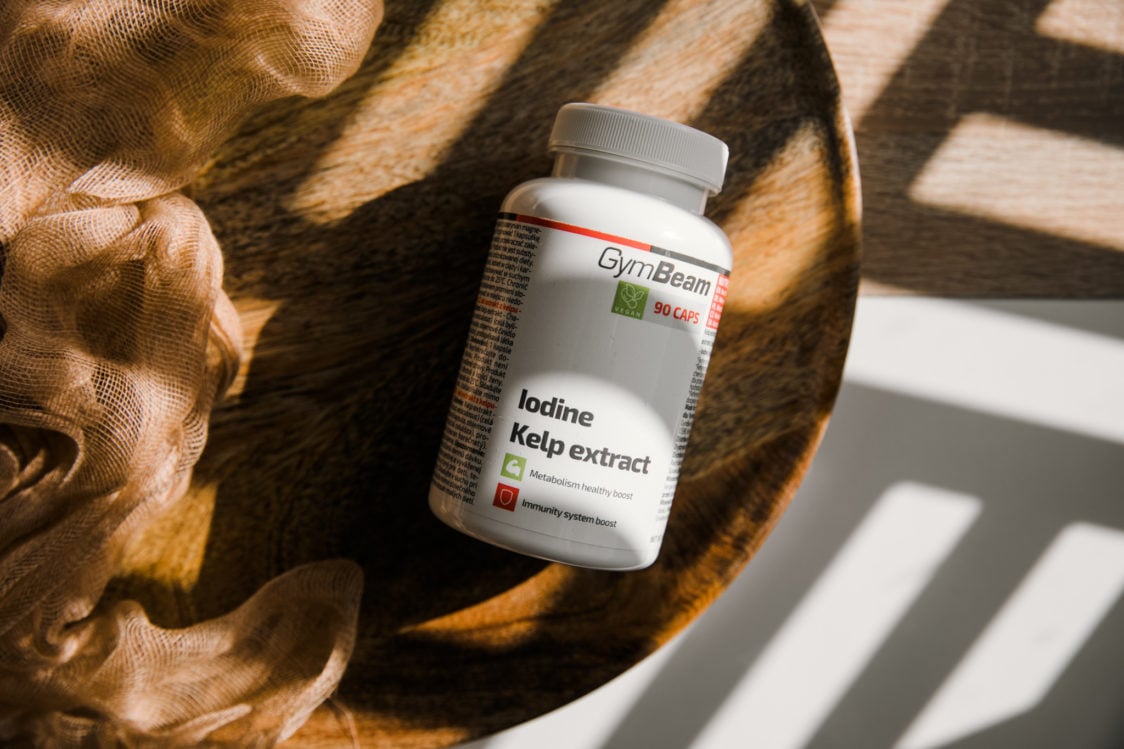
8. Proteins
A purely plant-based diet in conjunction with sufficient protein intake is also a frequently discussed topic. When going vegan, meat, fish, eggs and dairy products are eliminated from the diet. These foods are among the richest and highest quality sources of protein, as they contain all the essential amino acids that our bodies cannot produce. These are needed for the protection and growth of muscles and other body tissues. They also make important enzymes, hormones and play an important role in immune function. This begs the question, “Is it even possible to eat a vegan diet and still have all the amino acids in your diet?”
If you follow a few simple rules, you can certainly do it. First, it’s important to remember that plant-based protein sources often don’t contain all the essential amino acids. Legumes typically lack methionine and cysteine, and cereals lack lysine. However, when you combine these sources, you can easily achieve the full amino acid spectrum and get a complete protein source. It’s not complicated, just eat a varied diet and consume different sources of legumes (lentils, tofu, beans) and grains (oats, rice, quinoa) throughout the day. [29]
It is also important to watch the portion size of protein – rich foods. Plant-based ones often have a lower absorption rate compared to animal-based ones, so you need to eat a bit more of them. For this reason, vegans are commonly advised to increase their protein intake by around 10% from the recommended levels. Probiotics could also help with their higher usability. [5, 29]
Vegan proteins are also a handy tool for increasing the protein in your diet. You can choose a single-component (soy, rice, pea) or a more complex product containing several types of protein, which typically have a more optimal representation of amino acids. Thus, the same rule of thumb applies to them as it did to food – a combination of several types of protein is preferable. [5, 29]
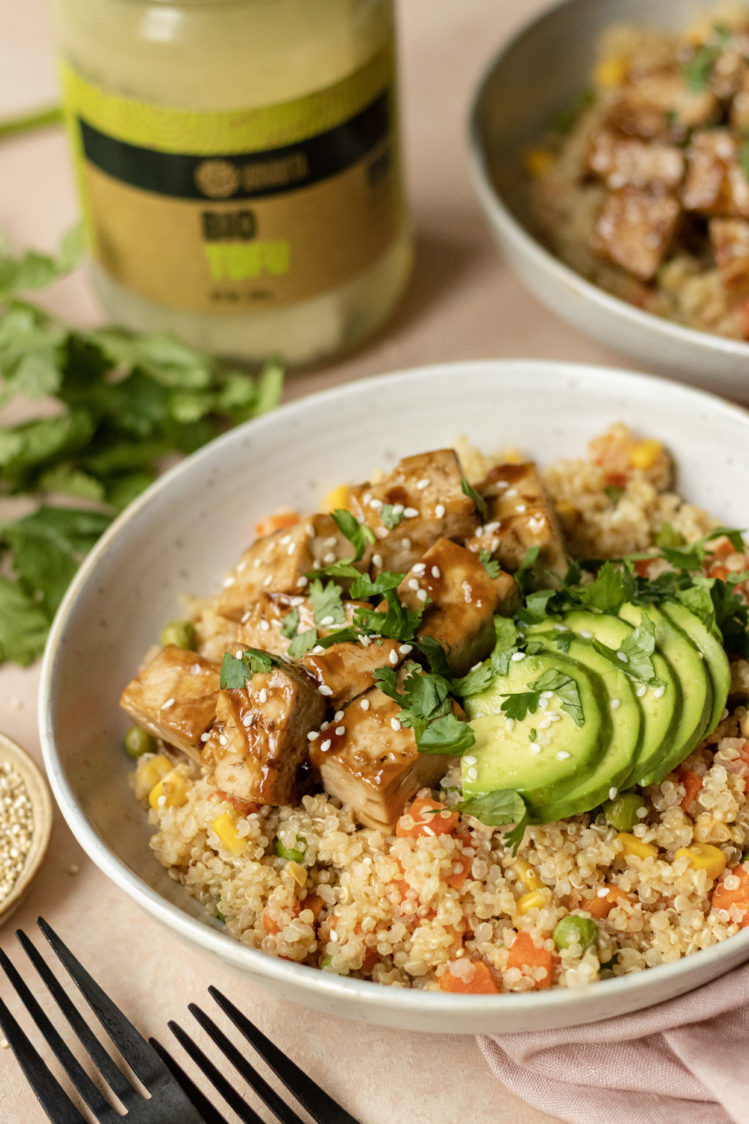
What are plant sources of protein?
- lentils, beans, chickpeas, soybeans and other legumes
- tofu, tempeh, seitan
- soy, rice or pea protein
- complex plant-based proteins
- soy or pea milk alternatives
- vegan meat alternatives
What is the recommended daily protein intake?
- The EFSA recommends that adults eat 0.83 g of protein per kg body weight (BW) per day. Women should add between 1 g and 28 g of protein per day (depending on trimester) during pregnancy. During breastfeeding, increase the basal protein intake by 19 g. [30]
- According to the DACH, a daily intake of 0.8 – 1 g of protein per kilogram of BW is sufficient for the normal adult population. It recommends that pregnant women have 0.9 g of protein per kg of BW and that breastfeeding women increase this intake to 1.2 g. [11]
- Athletes typically have a higher need for protein. Most of them might be satisfied with an intake in the range of 1.4 – 2 g of protein per kg of BW per day, which is the basic recommendation for active people who want to build muscle mass. Vegans could increase this intake by a further 10% due to the lower usability of plant proteins. [5]
If you are wondering what plant-based meat alternatives exist and their nutritional value, read our article Plant-Based Meat Alternatives: Which Are the Best, How Much Protein Do They Contain and Can They Fully Replace Meat?
9. Creatine
Creatine is a compound that our body normally produces every day and stores mainly in the muscles. However, its sources are also foods, especially of animal origin (meat, fish, milk). For this reason, vegans have a limited dietary intake of creatine, which often leads to lower creatine stores in the body. Athletes in particular should be concerned about their intake of this substance. It helps to restore cellular energy in the muscles, which you may also know as ATP. This is especially important during intense exercise, when you need maximum speed and explosiveness. Creatine also plays an important role in strength sports due to its increased availability of fast energy, while also supporting muscle growth. [31]
The good news is that you can effectively increase creatine stores in your muscles even on a purely plant-based diet, with the help of dietary supplements. Their effectiveness is proven by a number of scientific studies, according to which increasing the level of creatine in the body leads to better performance, growth in strength and muscle mass. [5]
What is the recommended dose of creatine?
According to studies, long-term intake of 3 – 5g of creatine per day is shown to work effectively. This dose is taken before or after training or at any time during the day on non-training days. For maximum absorption, it is sometimes recommended to combine it with a carbohydrate source (maltodextrin, fruit juice) and protein. [5, 31]
If you want to learn more about creatine, you should not miss our article How To Choose the Best Quality Creatine?
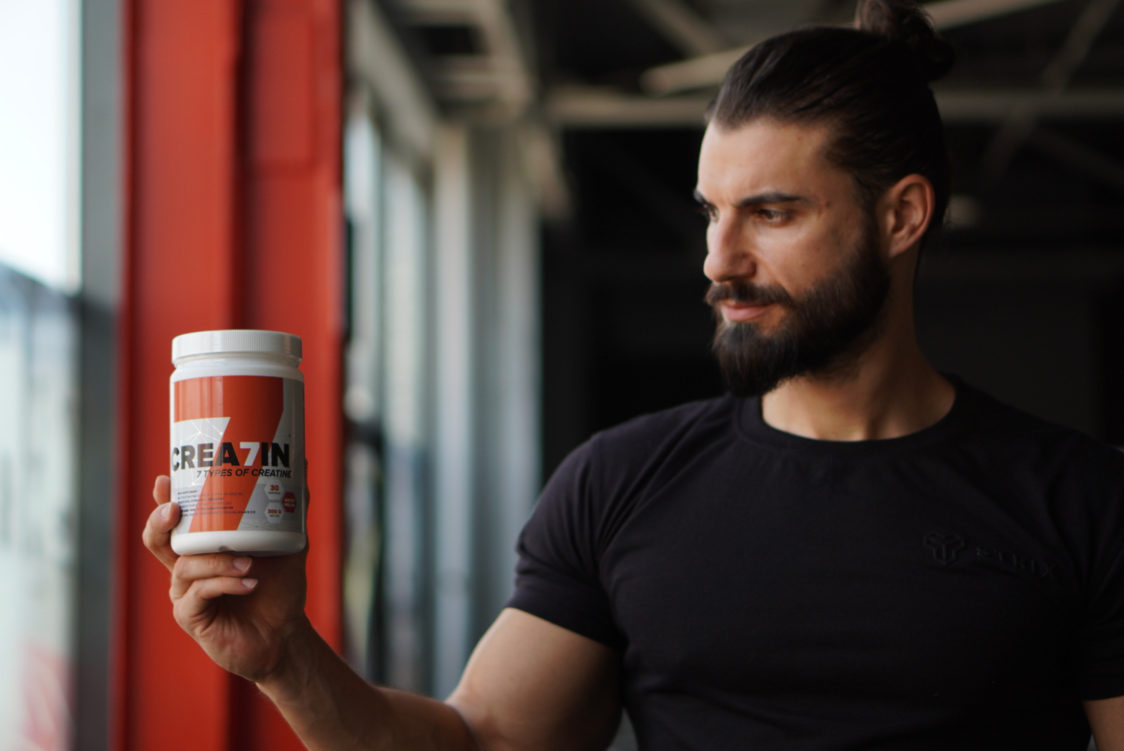
10. Carnosine
Carnosine is another natural substance that is produced from two amino acids – beta-alanine and histidine. It has been shown to have antioxidant effects as well as a positive effect on athletic performance. In fact, it can reduce the amount of lactic acid produced in the muscles during intense exercise. This can help to delay fatigue and improve training performance. The amount of carnosine in the body is particularly affected by the intake of beta-alanine, which is commonly found in meat or eggs. However, we would look in vain for this substance in foods of plant origin. For this reason, vegans may have less carnosine in their bodies than people on a mixed diet. [32]
The solution may be to take dietary supplements with carnosine or beta-alanine. Their effects are especially beneficial for athletes who train at high intensities, such as cross fitters, sprinters, or HIIT lovers.
What is the recommended dose of carnosine and beta-alanine?
Carnosine is most commonly taken in amounts of 500 – 1000 mg per day. In the case of beta-alanine, it is common to start with a dose of 4 – 6 g per day, which is reduced to a maintenance amount of 2 – 5 g after a month. [32-34]
What should you remember?
A well-planned vegan diet can contain all the important nutrients and bring a range of health benefits. Otherwise, it often lacks vitamin B12, iron, zinc, or protein. All of these substances are essential for management of daily activities and maintaining optimal health. For this reason, it is crucial to regularly include their sources in the form of foods with natural content or those that are fortified. In some cases, you might need to reach for dietary supplements.
If you have someone in your close circle who eats a purely plant-based diet, share this article with them. Maybe you can help them plan their diet even better.
[1] Sakkas, H., Bozidis, P., Touzios, C., Kolios, D., Athanasiou, G., Athanasopoulou, E., Gerou, I., & Gartzonika, C. Nutritional Status and the Influence of the Vegan Diet on the Gut Microbiota and Human Health. – https://doi.org/10.3390/medicina56020088
[2] Palmer, S. Nutrients of Concern for Individuals Following a Plant-Based Diet. – https://www.todaysdietitian.com/pdf/courses/PBDNutritentsofConcernPDF.pdf
[3] Barnard, N. D., Scialli, A. R., Turner-McGrievy, G., Lanou, A. J., & Glass, J. The effects of a low-fat, plant-based dietary intervention on body weight, metabolism, and insulin sensitivity. – https://doi.org/10.1016/j.amjmed.2005.03.039
[4] Tran, E., Dale, H. F., Jensen, C., & Lied, G. A. Effects of Plant-Based Diets on Weight Status: A Systematic Review. – https://doi.org/10.2147/DMSO.S272802
[5] Rogerson, D. Vegan diets: Practical advice for athletes and exercisers. – https://doi.org/10.1186/s12970-017-0192-9
[6] Vegetarian and Vegan Trends Pushing More People Into Deficiency Risk. – https://www.hsis.org/vegetarian-and-vegan-trends-pushing-more-people-into-deficiency-risk/
[7] Office of Dietary Supplements .Vitamin B12. – https://ods.od.nih.gov/factsheets/VitaminB12-HealthProfessional/
[8] Craig, W. J. Health effects of vegan diets. – https://doi.org/10.3945/ajcn.2009.26736N
[9] Watanabe, F., Yabuta, Y., Bito, T., & Teng, F. (2014). Vitamin B12-Containing Plant Food Sources for Vegetarians. – https://doi.org/10.3390/nu6051861
[10] EFSA. Scientific Opinion on Dietary Reference Values for cobalamin (vitamin B12).– https://www.efsa.europa.eu/en/efsajournal/pub/4150
[11] DACH-Referenzwerte. – https://sge-ssn.christian.beta.cubetech.ch/grundlagen/lebensmittel-und-naehrstoffe/naehrstoffempfehlungen/dachreferenzwerte/
[12] The Vegan Society. What Every Vegan Should Know About Vitamin B12. – https://www.vegansociety.com/resources/nutrition-and-health/nutrients/vitamin-b12/what-every-vegan-should-know-about-vitamin-b12
[13] Nhs.Uk. Vitamin D. – https://www.nhs.uk/conditions/vitamins-and-minerals/vitamin-d/
[14] EFSA Panel on Dietetic Products, Nutrition and Allergies (NDA). (2016). Dietary reference values for vitamin D. – https://doi.org/10.2903/j.efsa.2016.4547
[15] Office of Dietary Supplements. Zinc. – https://ods.od.nih.gov/factsheets/Zinc-HealthProfessional/
[16] EFSA. Scientific Opinion on Dietary Reference Values for zinc. – https://www.efsa.europa.eu/en/efsajournal/pub/3844
[17] The Vegan Society. Iron. – https://www.vegansociety.com/resources/nutrition-and-health/nutrients/iron
[18] EFSA. Scientific Opinion on Dietary Reference Values for iron.– https://www.efsa.europa.eu/en/efsajournal/pub/4254
[19] Office of Dietary Supplements. Omega-3 Fatty Acids. – https://ods.od.nih.gov/factsheets/Omega3FattyAcids-Consumer/
[20] Vegetarian’s Challenge—Optimizing Essential Fatty Acid Status. – https://www.todaysdietitian.com/newarchives/020810p22.shtml
[21] Brenna, J. T., Salem, N., Sinclair, A. J., Cunnane, S. C., & International Society for the Study of Fatty Acids and Lipids, ISSFAL. Alpha-Linolenic acid supplementation and conversion to n-3 long-chain polyunsaturated fatty acids in humans. – https://doi.org/10.1016/j.plefa.2009.01.004
[22] Significance of Ratio of Omega-3 and Omega-6 in Human Health with Special Reference to Flaxseed Oil. – https://scialert.net/fulltext/?doi=ijbc.2016.1.6
[23] EFSA. Scientific Opinion on Dietary Reference Values for fats, including saturated fatty acids, polyunsaturated fatty acids, monounsaturated fatty acids, trans fatty acids, and cholesterol. – https://www.efsa.europa.eu/en/efsajournal/pub/1461
[24] Office of Dietary Supplements. Calcium. – https://ods.od.nih.gov/factsheets/Calcium-HealthProfessional/
[25] Welch, A. A., Mulligan, A., Bingham, S. A., & Khaw, K.-T. Urine pH is an indicator of dietary acid-base load, fruit and vegetables and meat intakes: Results from the European Prospective Investigation into Cancer and Nutrition (EPIC)-Norfolk population study. – https://doi.org/10.1017/S0007114507862350
[26] EFSA. Scientific Opinion on Dietary Reference Values for kalcium.– https://www.efsa.europa.eu/en/efsajournal/pub/4101
[27] Office of Dietary Supplements. Iodine. – https://ods.od.nih.gov/factsheets/Iodine-HealthProfessional/
[28] EFSA Panel on Dietetic Products, Nutrition and Allergies (NDA). Scientific Opinion on Dietary Reference Values for iodine. – https://doi.org/10.2903/j.efsa.2014.3660
[29] Today’s Dietitian Magazine. Plant Proteins.– https://www.todaysdietitian.com/newarchives/0217p26.shtml
[30] EFSA. EFSA sets population reference intakes for protein.– https://www.efsa.europa.eu/en/press/news/120209
[31] Frank, K., Patel, K., Lopez, G., & Willis, B. Creatine Research Analysis. – https://examine.com/supplements/creatine/research/
[32] Frank, K., Patel, K., Lopez, G., & Willis, B. Beta-Alanine Research Analysis. – https://examine.com/supplements/beta-alanine/
[33] Trexler, E. T., Smith-Ryan, A. E., Stout, J. R., Hoffman, J. R., Wilborn, C. D., Sale, C., Kreider, R. B., Jäger, R., Earnest, C. P., Bannock, L., Campbell, B., Kalman, D., Ziegenfuss, T. N., & Antonio, J. International society of sports nutrition position stand: Beta-Alanine. – https://doi.org/10.1186/s12970-015-0090-y
[34] Nootropics Expert. L-Carnosine .– https://nootropicsexpert.com/l-carnosine/

Add a comment